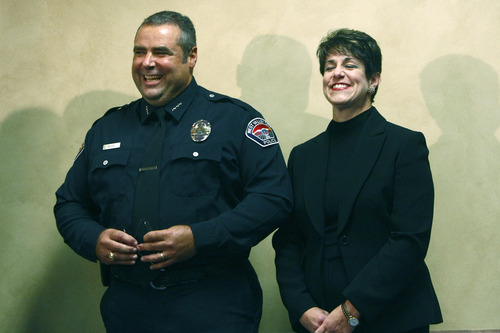This is an archived article that was published on sltrib.com in 2013, and information in the article may be outdated. It is provided only for personal research purposes and may not be reprinted.
The attorney for a former West Valley City officer fired after the fatal shooting of a 21-year-old woman filed papers Thursday alleging the department violated her client's rights, consistently employed unequal discipline and used investigators that had blatant conflicts of interest against her client.
In the appeal to the West Valley City Civil Service Commission, attorney Lindsay Jarvis argued that her client, former West Valley City detective Shaun Cowley, should be reinstated to the force.
West Valley City Police Chief Lee Russo said he couldn't comment directly on any of the allegations because he hadn't had a chance to review Jarvis' 41-page appeal, which she released to the news media late Thursday afternoon.
"Certainly we have to take a look as to what's in this document and assess what is real and what's not," Russo said.
A date has not been set for when Cowley will face the Civil Service Commission in a bid to get his job back.
But Russo said the case is only about Cowley's actions and that Jarvis makes admissions that he engaged in misconduct.
Jarvis, however, says Cowley's actions weren't enough to warrant termination and that in other cases — allegedly involving serious behavior including burglary and a fabricated search warrant — officers weren't terminated.
While seven of the nine officers who worked with Cowley in the now-disbanded Neighborhood Narcotics Unit were found to have engaged in wrongdoing ranging from taking property from suspect's vehicles to illegally using GPS devices, she said nobody else was fired. She said Lt. John Coyle, who is also appealing his disciplinary action, received the most serious punishment of the bunch — a demotion.
Cowley was fired in September after the Salt Lake County District Attorney's Office determined the Nov. 2, 2012, fatal shooting of Danielle Willard, 21, during an alleged drug bust, to be unjustified. The DA's office found that Cowley fired the first and fatal shot.
Jarvis also claims Cowley was threatened by his supervisor when he requested a transfer out of the narcotics unit because he was "completely burnt out" days before Willard was killed.
In her appeal, Jarvis alleges one of the lead investigators in the Willard case was a detective who had allegedly mishandled some of the same evidence Cowley was alleged to have mishandled.
She claims that a Drug Enforcement Administration Task Force detective was involved in an internal-affairs investigation into whether drugs linked to six pounds of methamphetamine were mishandled in the a case that also involved Cowley. At the same time, that detective was tasked with investigating Cowley's role in Willard's death.
"[The detective] was allowed to remain in charge of the officer-involved shooting, in which Detective Cowley, along with Detective Kevin Salmon, were considered alleged suspects," Jarvis argues. "This is a conflict of interest."
She argues that detective had a "jaded opinion" of Cowley and that the deputy chief assigned to oversee Cowley's criminal investigation was heard to call Cowley a "murderer" on multiple occasions.
"These statements [about being a murderer] were made in the presence of other West Valley City Police Department employees," Jarvis says, "thereby tarnishing Detective Cowley's reputation and demonstrating blatant and improper bias against Detective Cowley."
She also alleges that the department tasked Coyle and Sgt. Michael Johnson with investigating their own unit, the Neighborhood Narcotics Unit, for wrongdoing.
She alleges the unit's detectives were ordered by Johnson to destroy evidence and that the two supervisors cut off the lock to Cowley's locker "without receiving an official order," and didn't document or inventory the contents inside.
She also argues that internal affairs released statements made by Cowley that were protected by law to the district attorney's office and later to the FBI and discussed those with at least one other officer.
Those statements, Jarvis argues, significantly delayed the ongoing FBI investigation because they had to be sent to Washington, D.C., for redaction.
Shortly after District Attorney Sim Gill's office accepted the protected interviews, Jarvis claims, his office contacted the Salt Lake City Police Department and asked it to launch a criminal investigation into Cowley on allegations of theft.
The case has been screened six times, but no charges have ever been filed, Jarvis said.
Gill confirmed Thursday that his office received protected records from West Valley City, but it was legally allowed to do so because they were not being used to build a criminal case against Cowley. "It wasn't for any criminal issues that we were looking at," Gill said, noting that the records were used to evaluate whether cases should be dismissed.
Ultimately, state and federal prosecutors dismissed more than 100 criminal cases linked to undisclosed officers in the Neighborhood Narcotics Unit.
Twitter: @sltribjanelle



